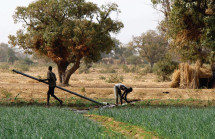Land is one of the most contested natural resources for three main reasons: first as a place to grow food and provide other economic goods such as fibre; and now also as a result of competition from the animal-feed and biofuel industries which have led to the rise global "land grabbing"; second, because of access to other natural resources, such as water, timbre and minerals; and third, as both home and territory, with social and spiritual importance to communities and larger societies. As a result of former conflicts between stakeholders, many attempts have been made to link peace-building settlements and processes with land reform policy. However, to date there remains little consensus among policy experts, and on the ground there continues to be much contention and renewed conflict over land reform policies that have been tried.
Dividing approaches into either state-driven, market-based or community-based is unhelpful, as ultimately resolving conflict will require engagement of all three institutions, and whatever combination works will depend on the particularities of the case at hand. However, we argue that for any land policies to be socio-economically and politically sustainable in the future, they will have to be pro-poor as well.
This paper discusses 9 key themes in pro-poor land policy: (1) Protection or transfer of land-based wealth in favour of the poor; (2) Transfer of land-based political power; (3) Class-consciousness; (4) Historical; (5) Gender-sensitive; (6) Ethnic-sensitive; (7) Productivity-increasing; (8) Livelihood-enhancing; (9) Rights-securing.
Contents
1. Land, conflict and development
2. Key Themes in Pro-Poor Land Policy
3. Concluding Remarks



